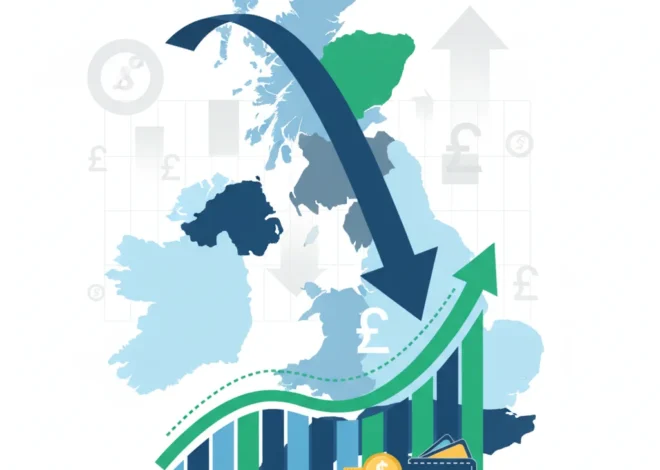
The UK’s New Tax Frontier: Why High-Earners in Partnerships are in the Government’s Crosshairs
The Shifting Sands of UK Fiscal Policy
In the world of finance and high-stakes business, change is the only constant. A recent announcement from the UK Chancellor has sent a clear signal across the nation’s professional landscape, reaffirming this truth. As part of a broader Budget plan, the government is sharpening its focus on the tax arrangements of partnerships, a move specifically designed to ensure those with “the broadest shoulders” contribute their fair share. This policy shift directly targets some of the country’s highest earners—lawyers, doctors, accountants, and consultants—who often operate within these structures. But what does this crackdown truly mean for the UK economy, for professionals, and for the future of wealth management? This article delves deep into the new rules, the economic drivers behind them, and the far-reaching implications for investors and business leaders alike.
The core of the initiative is a concerted effort by HM Revenue & Customs (HMRC) to scrutinize and reform the rules governing how partnerships allocate profits and, consequently, how they are taxed. For decades, the partnership model has offered a blend of flexibility and tax efficiency, making it the structure of choice for elite professional services. However, the government now perceives that some of these arrangements may be exploited to unfairly reduce tax liabilities, prompting a significant policy overhaul. Understanding this change is crucial for anyone involved in UK investing, business strategy, or personal financial planning.
Deconstructing the Partnership Model: Why Is It a Target?
To grasp the significance of this crackdown, one must first understand the unique nature of a business partnership, particularly a Limited Liability Partnership (LLP), which is common in professional services. Unlike a standard corporation, where the company itself is a separate legal entity that pays corporation tax, a partnership is fiscally transparent. This means the business’s profits “flow through” directly to the individual partners, who then pay income tax and National Insurance on their share.
This structure has several advantages, including operational flexibility and avoiding the “double taxation” that can occur in corporations (where profits are taxed at the corporate level and again as dividends at the personal level). However, the complexity arises in how profits are allocated among partners. Sophisticated profit-sharing agreements can sometimes be used to allocate profits to corporate members or to partners in lower tax jurisdictions, a practice HMRC is keen to curtail. The Chancellor’s plan aims to tighten these rules to ensure that profits are taxed in the hands of the individuals who earned them, at UK income tax rates. According to the Financial Times, this move is part of a broader strategy to increase the tax take from the UK’s wealthiest individuals without introducing more politically controversial measures like a direct wealth tax.
Beyond the Cap and Gown: Why the UK Graduate Hiring Slump is a Red Flag for the Economy
To illustrate the fundamental differences in tax treatment, consider the following comparison between a traditional Limited Company and a Limited Liability Partnership (LLP).
| Feature | Limited Liability Partnership (LLP) | Private Limited Company (Ltd) |
|---|---|---|
| Taxable Entity | Partners are taxed individually (fiscally transparent). | The company is a separate legal entity and pays Corporation Tax. |
| Primary Tax on Profits | Income Tax and National Insurance on individual partners’ profit shares. | Corporation Tax on company profits. |
| Profit Extraction | Profits are allocated directly to partners as drawings. | Directors/shareholders extract funds via salary (subject to PAYE) and dividends. |
| Potential for “Double Tax” | No, profits are taxed only once at the individual level. | Yes, profits are taxed via Corporation Tax, and dividends are then taxed again at the personal level. |
| Area of HMRC Scrutiny | Complex profit allocation agreements, especially those involving corporate members or offshore elements. | Director’s loan accounts, expenses, and the classification of dividends vs. salary. |
The Economic Backdrop: A Quest for Revenue
No policy exists in a vacuum. This crackdown is a direct response to the UK’s challenging economic climate. With national debt at levels not seen in decades, the Treasury is actively seeking avenues to bolster public finances. A report from the Office for Budget Responsibility frequently highlights the gap between public spending and tax receipts, a gap that must be closed through either spending cuts, economic growth, or tax increases (source). Targeting areas of perceived tax avoidance is seen as a more palatable option than raising headline tax rates for the general population.
From an economics perspective, this policy is rooted in the principle of horizontal equity—the idea that individuals with similar incomes should pay similar amounts of tax, regardless of how that income is structured. The government’s argument is that a highly-paid lawyer in a partnership should not have a significantly lower effective tax rate than a highly-paid executive on a company’s payroll. By closing these loopholes, the Treasury not only aims to raise billions in revenue but also to restore a sense of fairness to the tax system, a narrative that plays well with the wider electorate.
The Ripple Effect: What This Means for Professionals, Investors, and the Market
The implications of this policy shift are extensive and will be felt across various sectors.
For Professionals and Their Firms:
Partners in law, accounting, and medical firms will face increased scrutiny and potentially higher tax bills. The days of creatively allocating profits to minimize tax may be numbered. This will likely trigger a wave of restructuring as firms consult with tax advisors to ensure compliance. Some may even reconsider the LLP structure in favour of incorporation, despite the potential for double taxation. The key takeaway for these professionals is that compliance will become more complex and the cost of non-compliance significantly higher.
For Investors and the Stock Market:
For those investing in the UK, this signals a clear direction of travel for fiscal policy: a focus on compliance and a less tolerant attitude towards aggressive tax planning. While this doesn’t directly impact the stock market, it could indirectly influence investment decisions. For instance, it might make publicly listed professional services firms, which already operate under stricter transparency rules, appear more attractive relative to their private partnership counterparts. Furthermore, any policy that impacts the take-home pay of the UK’s highest earners could have a knock-on effect on the markets for luxury goods, high-end property, and wealth management services.
Wall Street's Paradox: Record Bank Profits Meet Stark Bubble Warnings
The Role of FinTech in the New Era of Compliance
This government crackdown coincides with a revolution in financial technology. The rise of sophisticated fintech and RegTech (Regulatory Technology) solutions provides HMRC with powerful new tools for data analysis and enforcement. Advanced algorithms can now sift through vast datasets to identify anomalous profit-sharing arrangements or flag structures that deviate from the norm.
On the flip side, this technology also offers a path to easier compliance for firms. Automated accounting systems, transparent reporting platforms, and even distributed ledger technologies like blockchain could be employed to create immutable, auditable records of profit allocation. A blockchain-based system, for example, could provide a transparent and tamper-proof ledger of how profits are distributed among partners, satisfying HMRC’s need for clarity. As the rules tighten, we can expect to see a surge in demand for fintech solutions designed to navigate the complexities of partnership banking and tax law, creating new opportunities in the tech sector. This technological shift is fundamentally changing the landscape of tax, moving it away from ambiguous interpretation and towards data-driven verification. A study by Deloitte noted that tax authorities globally are increasingly becoming more digital, leveraging technology to close tax gaps (source).
Conclusion: A New Paradigm for Wealth and Taxation
The Chancellor’s focus on tax partnerships is more than just a minor tweak to the tax code; it represents a fundamental shift in the government’s approach to taxing the wealthy. It’s a move away from headline-grabbing wealth taxes and towards a more granular, data-driven, and compliance-focused strategy. For high-earning professionals, the message is clear: the era of complex, tax-minimizing profit structures is drawing to a close. For investors and business leaders, it serves as a crucial reminder that the regulatory and fiscal landscape is constantly evolving, driven by economic pressures and technological advancements.
As the UK continues to navigate its post-Brexit identity and recover from recent economic shocks, we can expect this focus on tax equity and compliance to intensify. The partnership crackdown is not an isolated event but rather the opening chapter in a new story about wealth, responsibility, and the role of technology in ensuring everyone pays their part. Staying ahead of these changes will be the key to successful financial strategy in the years to come.
Decoding the Economy: What a Cryptic Crossword Reveals About Modern Finance


